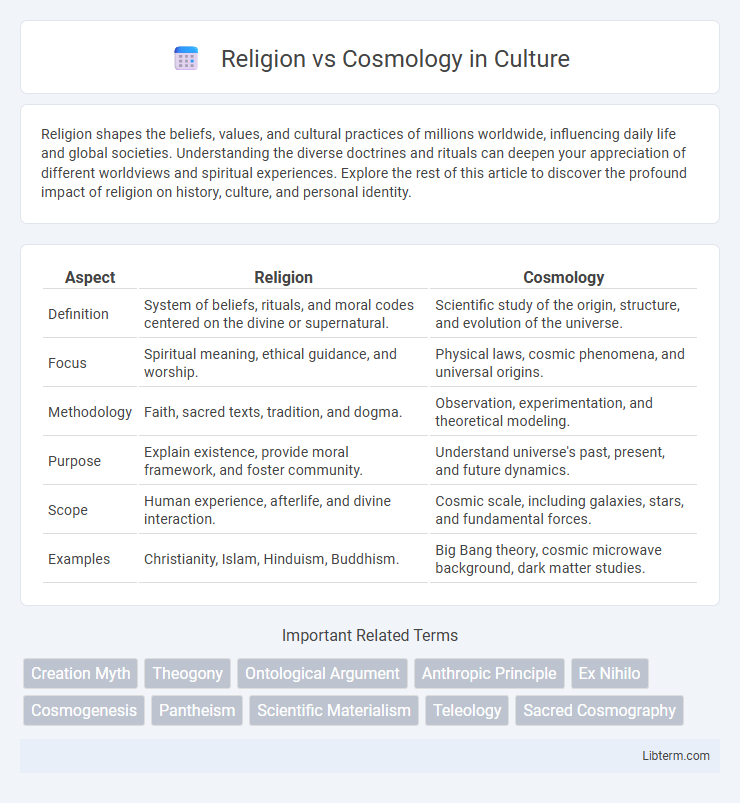Religion shapes the beliefs, values, and cultural practices of millions worldwide, influencing daily life and global societies. Understanding the diverse doctrines and rituals can deepen your appreciation of different worldviews and spiritual experiences. Explore the rest of this article to discover the profound impact of religion on history, culture, and personal identity.
Table of Comparison
| Aspect | Religion | Cosmology |
|---|---|---|
| Definition | System of beliefs, rituals, and moral codes centered on the divine or supernatural. | Scientific study of the origin, structure, and evolution of the universe. |
| Focus | Spiritual meaning, ethical guidance, and worship. | Physical laws, cosmic phenomena, and universal origins. |
| Methodology | Faith, sacred texts, tradition, and dogma. | Observation, experimentation, and theoretical modeling. |
| Purpose | Explain existence, provide moral framework, and foster community. | Understand universe's past, present, and future dynamics. |
| Scope | Human experience, afterlife, and divine interaction. | Cosmic scale, including galaxies, stars, and fundamental forces. |
| Examples | Christianity, Islam, Hinduism, Buddhism. | Big Bang theory, cosmic microwave background, dark matter studies. |
Introduction to Religion and Cosmology
Religion explores spiritual beliefs, sacred narratives, and divine influences shaping human purpose, often grounded in faith and tradition. Cosmology studies the universe's origin, structure, and evolution using scientific theories such as the Big Bang, dark matter, and cosmic inflation. Both frameworks address existence and reality but differ in methodology: religion relies on metaphysical explanations, while cosmology employs empirical evidence and mathematical models.
Defining Key Concepts: Religion and Cosmology
Religion encompasses structured beliefs, rituals, and moral frameworks centered on the divine, spirituality, and human purpose, often rooted in sacred texts and traditions. Cosmology is the scientific study of the universe's origin, structure, evolution, and fundamental laws, heavily relying on empirical data and theoretical physics. Defining religion and cosmology clarifies their distinct approaches: religion addresses metaphysical meaning and moral guidance, while cosmology investigates physical reality through observation and experimentation.
Historical Interplay Between Religion and Cosmology
Religion and cosmology have historically intertwined in shaping human understanding of the universe, with ancient civilizations often integrating mythological narratives into cosmological models. Early religious texts from Mesopotamia, Egypt, and India reflect cosmological themes that explain creation, celestial phenomena, and the order of cosmos, influencing societal worldviews. The transition to scientific cosmology during the Renaissance challenged religious interpretations, yet both domains continue to impact philosophical and existential inquiries about the origin and nature of the universe.
Ancient Cosmological Views in Religious Texts
Ancient cosmological views in religious texts present the universe as a divinely ordered creation, where celestial bodies and natural phenomena symbolize spiritual truths. Texts like the Bible, Hindu Vedas, and Mesopotamian myths describe the cosmos through narratives of creation, often involving gods who shape the heavens and earth, reflecting early attempts to explain existence. These religious cosmologies integrate metaphysical concepts with observational knowledge, forming a foundational framework that influenced both theological doctrine and early scientific thought.
Major Religious Perspectives on the Universe
Major religious perspectives on the universe often present creation narratives that attribute the cosmos to divine beings or forces, such as the Judeo-Christian belief in God's creation in six days or Hinduism's concept of cyclical cosmic creation and destruction governed by deities like Brahma and Shiva. These views offer explanations of the universe's origin rooted in spirituality and purpose, contrasting with cosmology's scientific approach that examines the universe's structure, origin, and evolution based on empirical evidence and theories like the Big Bang. Understanding these perspectives highlights the profound differences between faith-based interpretations and cosmological models while acknowledging their cultural and philosophical significance.
Scientific Revolutions and Cosmic Understanding
Scientific revolutions such as the Copernican, Newtonian, and Einsteinian paradigms fundamentally transformed cosmology by shifting from geocentric, static models to a dynamic, expanding universe based on empirical observation and mathematical physics. Religion historically offered creation narratives grounded in divine agency, often conflicting with cosmology's evolving explanations derived from evidence like the cosmic microwave background radiation and redshift observations. The ongoing dialogue between religion and cosmology emphasizes how scientific advancements continuously reshape humanity's cosmic understanding, challenging literal interpretations while enriching philosophical reflections about existence.
Conflicts and Controversies: Religion vs. Science
Religion and cosmology often clash over explanations of the universe's origins, with religious doctrines advocating creationist views conflicting with the Big Bang theory and evolutionary cosmology supported by scientific evidence. Controversies arise in education, such as debates over teaching intelligent design versus evolution in schools. These conflicts highlight fundamental differences in epistemology, with religion relying on faith and revelation, while cosmology depends on empirical data and testable hypotheses.
Modern Cosmology: Challenges to Traditional Beliefs
Modern cosmology challenges traditional religious beliefs by providing scientific explanations for the origin and structure of the universe, such as the Big Bang theory and cosmic inflation. Observations from advanced telescopes and cosmic microwave background radiation studies offer empirical data that contradict literal interpretations of religious creation stories. This growing body of evidence prompts re-evaluation of metaphysical claims and encourages dialogue between scientific inquiry and spiritual perspectives.
Dialogue and Integration: Bridging Religion and Cosmology
Dialogue and integration between religion and cosmology foster mutual understanding by exploring shared questions about the universe's origin and existence. Religious narratives and cosmological theories offer complementary perspectives, encouraging collaborative inquiry into metaphysical meanings and scientific discoveries. This interdisciplinary approach promotes a synergy where spiritual insights and empirical evidence enrich humanity's quest for meaning and knowledge.
Future Directions: Coexistence or Divergence?
Future directions in the relationship between religion and cosmology explore the potential for either coexistence or divergence as scientific discoveries about the universe advance. Some theorists predict that increasing empirical evidence from cosmology will challenge traditional religious narratives, potentially leading to divergent worldviews. Conversely, integrative approaches suggest that religion may adapt by incorporating cosmological insights, fostering a complementary dialogue that enriches both spiritual understanding and scientific knowledge.
Religion Infographic

 libterm.com
libterm.com